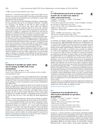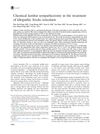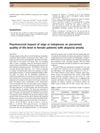April 2024 in “International journal of molecular sciences” Combination pharmacotherapy is generally more effective for treating keloids and hypertrophic scars.
 February 2024 in “The Open dermatology journal”
February 2024 in “The Open dermatology journal” Alopecia Areata affects people of all ages worldwide, is likely caused by genetic and environmental factors, and can lead to stress and depression, highlighting the need for treatments that address both physical and mental health.
 October 2023 in “Journal of Drug Delivery Science and Technology”
October 2023 in “Journal of Drug Delivery Science and Technology” Electrospun nanofibers might be a promising new treatment for hair loss.
 October 2023 in “International journal of women’s dermatology”
October 2023 in “International journal of women’s dermatology” Hair camouflage methods like wigs and extensions can help Black women with alopecia feel better but may also damage hair if not used carefully.
 July 2021 in “IntechOpen eBooks”
July 2021 in “IntechOpen eBooks” Ginseng, especially its component ginsenosides, can promote hair growth, reduce hair loss, and potentially treat conditions like alopecia by affecting cell pathways and cytokines.
August 2022 in “Nutrients” Nutritional supplements may help improve hair growth in female pattern hair loss.
 22 citations,
May 2011 in “American Journal of Clinical Dermatology”
22 citations,
May 2011 in “American Journal of Clinical Dermatology” Recognizing and managing skin-related psychiatric disorders in children is crucial for effective treatment.
 105 citations,
February 2017 in “British Journal of Dermatology”
105 citations,
February 2017 in “British Journal of Dermatology” Survivors of Stevens-Johnson syndrome/toxic epidermal necrolysis need ongoing care for various long-term health problems.
 40 citations,
July 2008 in “Drug Discovery Today”
40 citations,
July 2008 in “Drug Discovery Today” Current treatments for male pattern baldness include minoxidil and finasteride, with new options being developed.
 February 2008 in “Experimental dermatology”
February 2008 in “Experimental dermatology” Oxidative stress plays a significant role in vitiligo, and both skin and non-skin cells may be involved.
 1 citations,
October 2013 in “Revue d'Épidémiologie et de Santé Publique”
1 citations,
October 2013 in “Revue d'Épidémiologie et de Santé Publique” Higher unemployment rates are linked to increased suicide rates, especially in men aged 25-49 in France.
 94 citations,
January 2000 in “The Journal of Clinical Endocrinology and Metabolism”
94 citations,
January 2000 in “The Journal of Clinical Endocrinology and Metabolism” Spironolactone most effective for hirsutism, but has side effects.
 41 citations,
July 2009 in “International Journal of Trichology”
41 citations,
July 2009 in “International Journal of Trichology” 58% of men aged 30-50 have hair loss, with severity increasing with age.
 2 citations,
January 2021 in “JAAD Case Reports”
2 citations,
January 2021 in “JAAD Case Reports” Using a special laser and skin medication together successfully cleared a skin condition in a pregnant woman.
 April 2012 in “Informa Healthcare eBooks”
April 2012 in “Informa Healthcare eBooks” AGA is a common hair loss affecting both genders, treated with various therapies to promote regrowth and slow thinning.
 3 citations,
September 2015 in “Journal of Vascular Surgery”
3 citations,
September 2015 in “Journal of Vascular Surgery” Chemical lumbar sympathectomy is an effective and safe treatment for idiopathic livedo reticularis.
 January 1998 in “Lasers in Surgery and Medicine”
January 1998 in “Lasers in Surgery and Medicine” Lasers are effective and safe for various medical treatments, including cancer, wound healing, and skin conditions.
December 2021 in “Journal of BP Koirala Institute of Health Sciences” Androgenetic alopecia affects men's emotions more than symptoms or daily function.
January 2020 in “Medpluse International Journal of Anatomy”  April 2022 in “Medicina estética”
April 2022 in “Medicina estética” Minoxidil is the only FDA-approved treatment for female hair loss, with other potential treatments needing more research for effectiveness.
54 citations,
April 2011 in “Journal of Multidisciplinary Healthcare” SLE patients often face depression and anxiety due to physical changes, with African-American and Hispanic patients having higher unmet psychological needs.
 29 citations,
November 2018 in “Journal of The European Academy of Dermatology and Venereology”
29 citations,
November 2018 in “Journal of The European Academy of Dermatology and Venereology” Personality traits and anxiety affect hair loss patients' quality of life.
 9 citations,
December 2012 in “The Journal of Dermatology”
9 citations,
December 2012 in “The Journal of Dermatology” Wearing wigs or hairpieces improves self-esteem, adaptability, and competence in women with alopecia areata.
 5 citations,
April 2016 in “PubMed”
5 citations,
April 2016 in “PubMed” Young men with mild hair loss who experience significant social and emotional distress are more likely to have sexual problems.
 1 citations,
October 2022 in “Cureus”
1 citations,
October 2022 in “Cureus” Patients with chronic skin disorders often experience depression, anxiety, and reduced quality of life and may benefit from psychiatric help.
April 2024 in “Cosmetics” Wigs help improve self-esteem and quality of life for people with hair loss from alopecia areata.
 August 2023 in “Psychology, Health & Medicine”
August 2023 in “Psychology, Health & Medicine” Hair loss (androgenetic alopecia) mildly to moderately affects men's quality of life but not significantly their mental health.
 May 2023 in “Dermatology online journal”
May 2023 in “Dermatology online journal” Kids with vitiligo, psoriasis, or alopecia areata are more likely to experience anxiety, depression, and social challenges.
 36 citations,
November 2018 in “American Journal of Clinical Dermatology”
36 citations,
November 2018 in “American Journal of Clinical Dermatology” Alopecia is linked to various health and mental conditions, impacts life quality, and needs medical attention beyond its cosmetic effects.






















